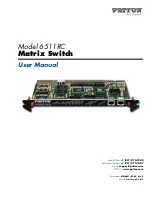
92
Routing Configuration
Routing Information Protocol
Routing Information Protocol (RIP) is one of the protocols which may be used by routers to exchange
network topology information. It is characterized as an “interior” gateway protocol, and is typically used
in small to medium-sized networks.
RIP Configuration
A router running RIP sends the contents of its routing table to each of its adjacent routers every 30
seconds. When a route is removed from the routing table it is flagged as unusable by the receiving
routers after 180 seconds, and removed from their tables after an additional 120 seconds.
There are two versions of RIP:
• RIP-1 defined in RFC 1058
–
Routes are specified by IP destination network and hop count
–
The routing table is broadcast to all stations on the attached network
• RIP-2 defined in RFC 1723
–
Route specification is extended to include subnet mask and gateway
–
The routing table is sent to a multicast address, reducing network traffic
–
An authentication method is used for security
The PowerConnect 6200 Series supports both versions of RIP. You may configure a given port:
• To receive packets in either or both formats
• To transmit packets formatted for RIP-1 or RIP-2 or to send RIP-2 packets to the RIP-1 broadcast
address
• To prevent any RIP packets from being received
• To prevent any RIP packets from being transmitted
Summary of Contents for POWERCONNECT 6200 SERIES
Page 28: ...28 System Configuration ...
Page 72: ...72 Switching Configuration ...
Page 134: ...134 Device Security ...
Page 147: ...Quality of Service 147 Figure 7 4 DiffServ VoIP Example Network Diagram ...
Page 160: ...160 Multicast ...
Page 176: ...176 Utility ...
















































